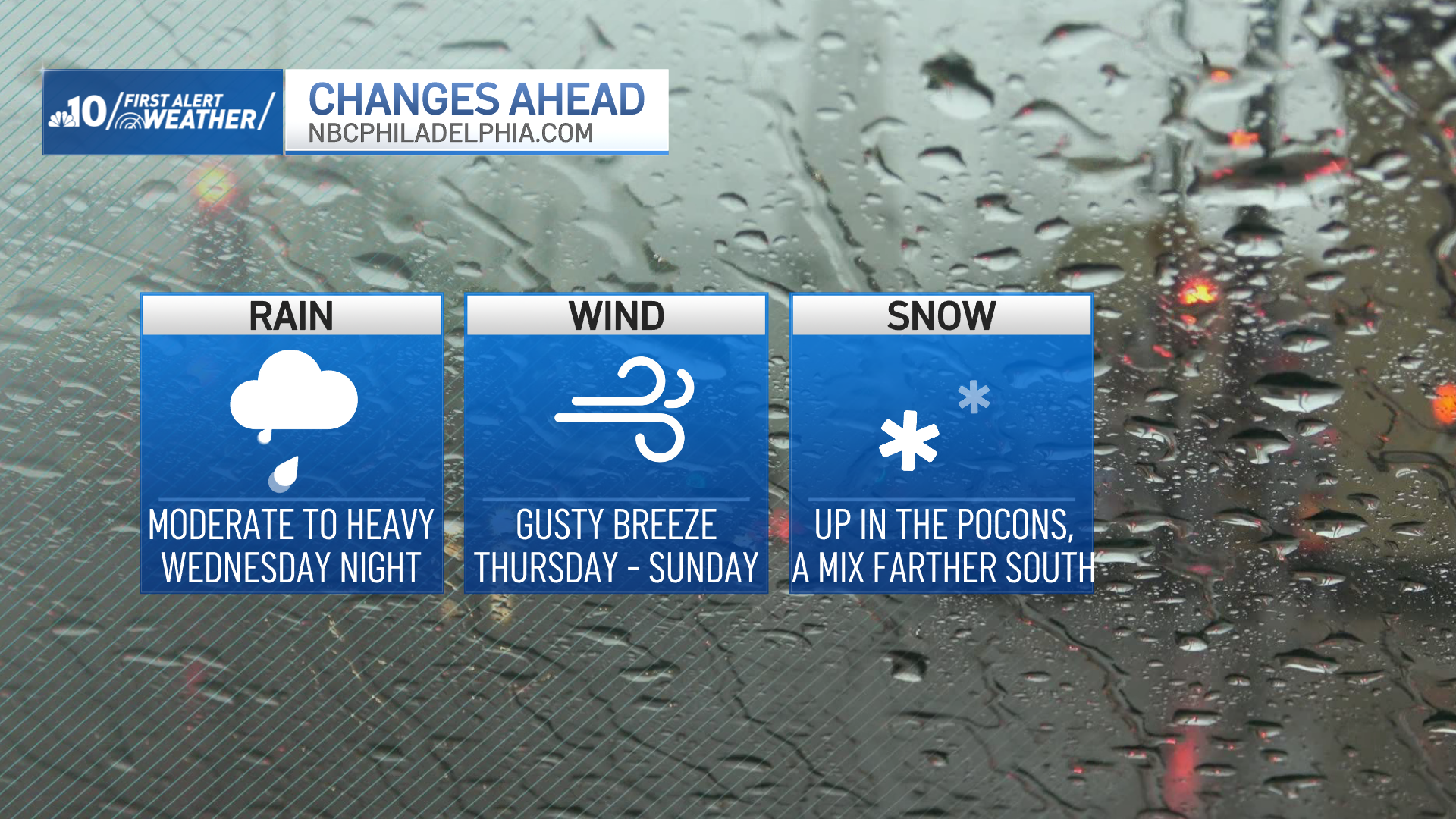After nearly four years atop the Philadelphia Police Department, 48-year-old Danielle Outlaw is heading off to greener pastures -- or at least, uniforms in a different shade of blue -- as she has accepted a role as the Deputy Chief Security Officer for the Port Authority of New York and New Jersey.
As Friday is her last day, NBC10 hoped to provide a short look at her career in Philadelphia and the ups and downs she endured during her time in the City of Brotherly Love.
In December of 2019, Mayor Jim Kenney named Outlaw -- who had spent the previous two years as chief of police for Portland, Oregon -- as commissioner of the Philadelphia Police Department.
Get top local stories in Philly delivered to you every morning. Sign up for NBC Philadelphia's News Headlines newsletter.

First year on the job
Outlaw stepped into office in February 2020.
Local
Breaking news and the stories that matter to your neighborhood.
Her first day on the job, Outlaw made headlines by doing away with an existing requirement that prohibited police officers from having painted nails.
But, in her first year, Outlaw would be faced with much more complicated issues than the color of officers' nail polish.
Less than a month after starting the job, Outlaw was faced with the death of Sergeant James R. O’Connor, a SWAT officer who was killed in the line of duty.
"It takes a special person to do this job and that's who this corporal was," Outlaw said at the time of O'Connor, who was a 23-year-veteran of the force.
O'Connor was part of a team serving a homicide warrant at a home in the city's Frankford neighborhood and was fatally injured when someone opened fire through a closed door on the second floor.
Then, with just three months on the job, she faced a new challenge as thousands of protestors took to the streets in the aftermath of the death of George Floyd at the hands of a police officer in Minneapolis, Minnesota.
After Floyd's death, thousands took to the streets, both nationally and in Philadelphia, to protest the killing of an unarmed man who was apprehended after allegedly attempting to use a counterfeit $20 bill.
And, in Philadelphia, the police were unprepared for the unrest.
In an interview with NBC10, after the protests, Outlaw said that after talking to other members of the police and city officials, she never thought the situation in the city would grow to the level it did.
“I had no reason to believe that what they were saying wasn’t true,” she said.
But, after seeing looting and damage throughout the city as crowds grew to include thousands of participants, on the second day of protesting, Outlaw gave the order to allow police to use tear gas against protestors.
It's a decision that would cost Philly taxpayers nearly $10 million.

Not long after this incident, Outlaw would need to address the police killing of Walter Wallace Jr.
The 27-year-old Wallace was shot and killed by police officers on Oct. 26 of 2020.
Officers shot Wallace after he refused to drop a knife, but, the family argued Wallace was having a mental health crisis at the time and his mother had been begging the officers not to shoot him.
In fact, Wallace's parents argued they had called for an ambulance, not the police, in this situation.
Wallace's slaying led to protests and Outlaw promised more tasers, as well as crisis intervention training, for officers on the street in order to be better equipped to handle mental health cases.
After a lawsuit, Philadelphia agreed to pay Wallace's family $2.5 million.
Also during Outlaw's first year on the job, Philadelphia saw its murder rate jump to the highest it had been in at least a decade.
The next year would be even worse. The city experienced 562 homicides in 2021, which, the city's controller's office noted, made it the "deadliest year in Philadelphia’s recorded history."
It would be unfair to lay the rise in homicides in Philadelphia during this time solely at Outlaw's feet, as the murder rate nationwide grew during the COVID-19 pandemic.
Perhaps, it would instead be more appropriate to note that, in 2020, police only made arrests in about 37% of fatal shootings in Philadelphia.
Working to improve
That year, the city would also adopt a number of police reforms intended to make a dent in some of these issues, which did lead to some change.
Homicides in the city dropped eight-percent from 2021 to 2022. And, as reported by the non-profit gun violence-centric publication, The Trace, police made arrests in more than 48% of homicides in 2022.
So far this year, as of Wednesday, Sept. 20, the city's homicide rate has dropped again, and is about 18% lower than it was at the same time in 2021.
Still, Outlaw expressed issues with getting the police force to run as effectively as she hoped.
In 2021, Outlaw said that police accountability reforms were key to reducing gun violence in the city.
"You can't have one without the other," she told NBC10, at that time.
Yet, she said then that the department's "systems of accountability are lacking" and that the force's process for bringing disciplinary action to officers needed to be overhauled "from the rooter to the tooter."
She also said she found working with the city's police union to be a challenge at times.
"The ability to actually lead and run the department, it can be a problem when there are contractual obligations," she told NBC10.

Recent missteps
If Outlaw had made any marked improvement in the city's crime rate during her previous years in the city, more recent police missques may have dulled the shine of that accomplishment.
The most glaring might be the mistakes police made in the lead up to the mass shooting before Independence Day that left five people dead on the streets of the city's Kingsessing neighborhood.
Following that shooting, it became clear that one of those dead on that block had likely been killed the day prior. All of the victims were alleged to have been killed by the same man however, 40-year-old Kimbrady Carriker.
Investigators found that a 9-1-1 call had been made after that man was killed -- hours before Carriker, allegedly, opened fire at pedestrians on S. 56th Street. Police officers mistakenly went to the wrong address, however.
A dispatcher that evening mistakenly told officers that they were to head to North 56th Street -- instead of the correct, South 56th Street address -- possibly missing an opportunity to apprehend the man's killer, who is now believed to have gone on to kill more innocent citizens.
It was an issue that Outlaw addressed once the dispatch call was made public.
"We did what we could with what we had and, yes, there were some missteps," she admitted.
With that incident still fresh in the minds of many, the police were under scrutiny again when, in August, an officer shot and killed a man in Kensington.
In this case, officer Mark Dial shot and killed 27-year-old Eddie Jose Irizarry after officers had followed Irizarry's car as he allegedly drove down a street the wrong way.
Initially, police representatives said the officer fired after Irizarry "lunged" at officers with a knife.
That statement was later proven false and police admitted that Irizarry never left his car.
In fact, body camera footage of the incident showed that Irizarry never even had a chance to speak to officers before he was shot and killed.
Once again, Outlaw needed to do damage control after police officials learned that the initial report on the incident was untrue.
"The body worn camera footage made it very clear that what we initially reported was not actually what happened," Outlaw said, in announcing that Dial would be suspended with the intent to fire.
What's next?
On Sept. 5, Mayor Jim Kenney announced that Outlaw had turned in her resignation with plans to become the Deputy Chief Security Officer for the Port Authority of New York and New Jersey.
In a short statement released along with the announcement, Outlaw said it had been an honor and a privilege to work in the city during Kenney's administration.
"The hard work, resilience, and professionalism of our force is truly commendable. Our team has shown incredible adaptability and has worked tirelessly to maintain our pillars of organizational excellence, crime prevention and reduction, and community engagement and inclusion even in the face of adversity," she said in a statement. "My staff’s teamwork, innovative thinking, and determination have kept the Department moving forward, and for that, I am extremely grateful.”
Sign up for our Breaking newsletter to get the most urgent news stories in your inbox.



